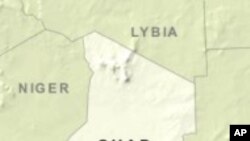Half a century ago, it was ranked the fourth largest lake in Africa. But over the last four decades, Lake Chad has shrunk to a fifth of its original size.
<!-- IMAGE -->Experts say a combination of human and natural factors are to blame for the rapid decline in water volume and surface area.
Lake Chad is a shadow of its former self, and scientists say it could disappear entirely if steps are not taken soon.
An estimated 30 million people in five countries once lived along its shores and still depend on it. Its decline is jeopardizing their livelihoods. The fish catch has slumped, agriculture has become precarious and several plant and animal species are losing their natural habitats and at risk of extinction.
In fact, the lake is currently less than seven meters deep and experts say at the current rate, there may no longer be any fishing, farming and herding around it by 2015.
Professor Elvis Ngolle Ngolle is Cameroon’s minister of forests and wildlife. He says the situation is alarming.
<!-- IMAGE -->"Lake Chad is virtually losing itself. I don’t want to say dying because statistics show that from the 1960s up to now, Lake Chad has lost its volume of water and its size from 36,000 square kilometers to just about 5,000 square kilometers. That’s to say that Lake Chad is only about one-fifth of its original size some forty years ago," Ngolle explains.
This is not the first time the lake has been faced with extinction. Scientists say about 1500 years ago, it dried up entirely but filled up again.
Climate change has caused failed rains and drought, the Sahara has continued to advance and wild water weeds have invaded the lake.
Problems caused by humans include uncontrolled irrigation, tree-cutting for fuel wood, a scramble for fertile land on the lake shores for farming and the construction of dams on tributaries feeding the lake.
<!-- IMAGE -->In recent years, conflicts have erupted as farmers and herdsmen have moved down south to compete for land with communities already living there. Meantime, countries bordering and sharing the lake are trading blame and accusing each other of not doing enough to check the problem.
The Lake Chad Basin Commission, the LCBC, was founded in 1964. It’s made up of Cameroon, Niger, Nigeria, Chad and the Central African Republic. Libya joined as sixth member state in 2008.
The LCBC was created to ensure sustainable and equitable management and conservation of the natural resources of the lake. But critics say its work has been limited to fruitless seminars and it has taken no concrete action to save the lake.
But in the last few months, its secretary general, Abdallah Umar Ganduje, has been touring member countries and pressing for joint action.
The commission is developing a charter, rules and regulations with the member nations to ensure that whatever can be done to assist Lake Chad is being done, he says.
<!-- IMAGE -->It has started feasibility studies on a plan to transfer waters to the lake from the Oubangui Basin in the Central African Republic. It would involve damming the Oubangui River and channeling some of its water through a 150-km navigable canal to Lake Chad.
The Lake Chad Basin Commission asked for financial support for the six-million-dollar project at the World Water Forum in Kyoto, Japan, in 2003.
So far, member countries of the commission have been able to pull together only one million dollars. They are planning to renew their request at the Copenhagen Summit in December.
<!-- IMAGE -->One of the countries bordering the lake, Cameroon, is leading conservation efforts on the lake shore. Its Ministry of Forests and Wildlife is collaborating with the US Embassy in Yaounde and the Chadian government to plant up to 90,000 trees around the lake to fight desertification and global warming.
The American Embassy has signed an agreement that will provide $ US 98,000 for the reforestation efforts. The grant is being administered by an NGO that will develop tree nurseries in partnership with local communities.
"It's in the interest of the US government to fight the effects of climate change," says Janet Garvey the US Ambassador to Cameroon.
"Tree-planting is one of the best methods we have found to help ameliorate some of those problems. I’m also very happy to participate in an event that brings Chad and Cameroon together," says the ambassador.
The joint effort is a timely example of regional cooperation to save the lake, he says, because scientists warn the effects of climate change are coming faster and are more serious than previously expected.
| Feedback |
| We'd like to hear what you have to say. Let us know what you think of this report and other news and features on our website. Email your views about what is happening in Africa to: africa@voanews.com. Please include your name and phone number if you would like us to include your comments on our programs. Or, telephone us and leave a message. In the US, call: (202) 205-9942. After you hear the VOA greeting, press the number "30" and leave your opinion. We may use it on our daily broadcasts. |







